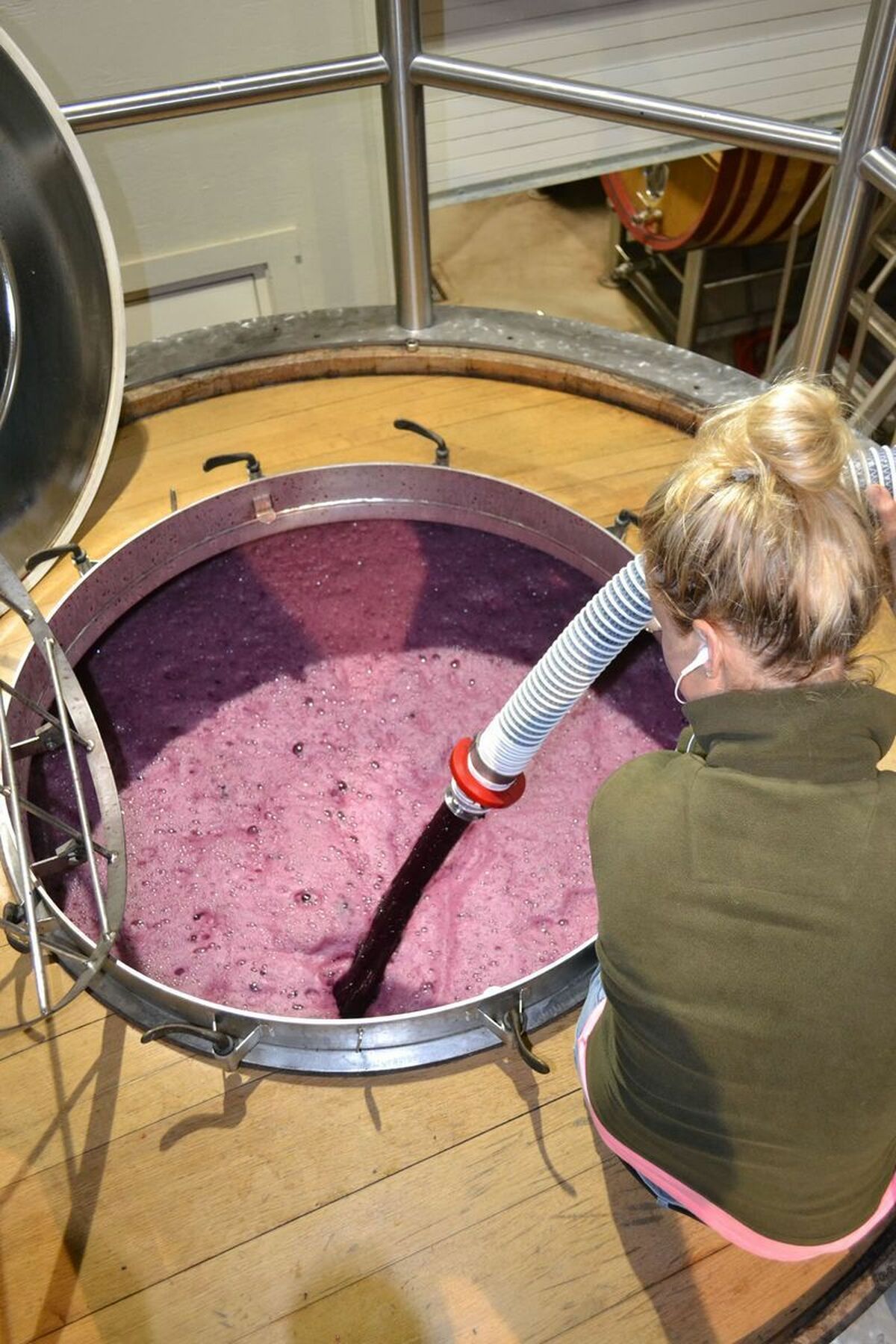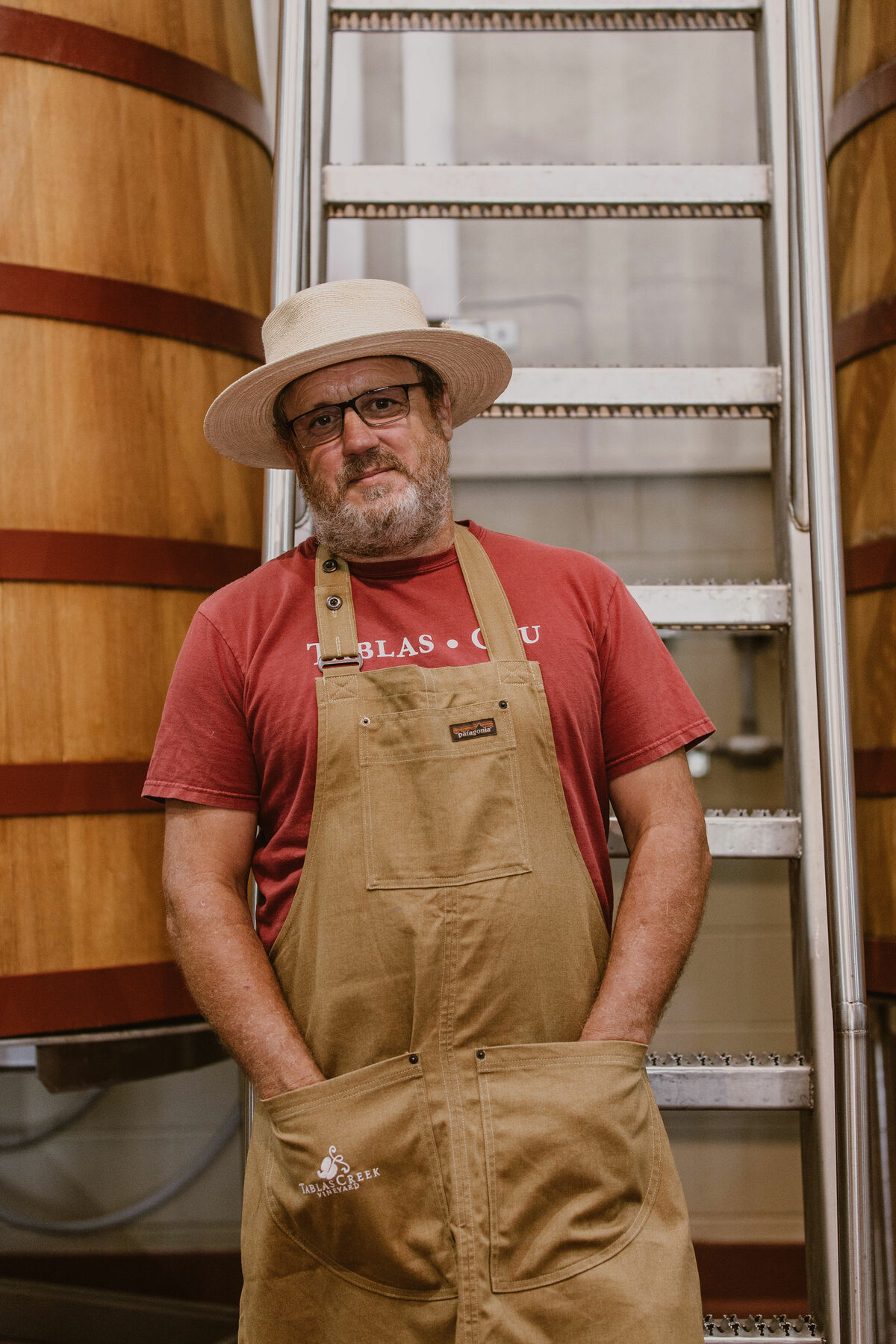Winemaking
Winemaking at Tablas Creek
At Tablas Creek, the focus of our winemaking is to preserve the wine’s expression of its grape varieties, its vintage and most importantly its terroir.
Our winemaking begins with our selective harvesting. Most vineyard blocks are picked by hand two, three or even four times to ensure that grapes arrive at the cellar at ideal ripeness.
Because we believe that the particular collection of yeasts that exists at our vineyard is unique, we use only native yeasts in fermentation. Native yeast fermentation gives a diversity of flavors, and a character more specific to the site.
Each lot is fermented separately. White grapes are whole-cluster pressed, and the juice is fermented in a mix of 1200-gallon foudres (for much of the Roussanne and some Grenache Blanc), small to medium French oak barrels (for a small portion of the Roussanne) and stainless steel (for the rest, including our Picpoul Blanc, Marsanne and Viognier). This balance gives a hint of the richness from oak fermentation, without heavy oak flavors that overwhelm the fruit or mask the character of place.
Red grapes (Mourvèdre, Syrah, Grenache Noir, and Counoise) are sorted and destemmed after harvest, and the juice and whole berries moved to a mix of open-top stainless steel, closed stainless steel, and 1600-gallon oak upright fermenters. During fermentation, the must is pumped over or punched down, or the cap submerged into the fermenting juice, twice a day. About 10 days after fermentation begins, the red wines are pressed, then moved to barrel to complete their primary and secondary fermentations.
Finally, the spring after harvest, both red and white wines are blended. Aromatic white wines are generally returned to stainless steel to settle and integrate briefly, while Roussanne-based whites and our red wines are moved to 1200-gallon French oak foudres and aged for an additional year.
Key in our winemaking is our dedication to the art of blending. As is traditional in Châteauneuf du Pape, we blend our Rhône varietals in an effort to produce wines of complexity, balance, and expressiveness. Different blending components can bring richness, freshness, spice, or minerality, and we believe that careful blending will produce wines that are greater than the sum of their parts.


Winemaker Neil Collins
Neil Collins, Winemaker and Vineyard Manager at Tablas Creek, was born and raised in Bristol, England. Trained as a chef, he moved into winemaking with stints with John Munch at Adelaida Cellars and Ken Volk at Wild Horse. At Adelaida, Neil met Robert Haas and the Perrins when Tablas Creek was in its infancy. Neil was so intrigued by the project that he offered his services, and spent a year working and learning at Château de Beaucastel.
Before the year was finished, Neil was offered the winemaker position at Tablas Creek, and he has overseen both the organic vineyard and the winery since 1998.
His philosophy is that great wines can only come from great grapes, and that the art of winemaking is founded on starting out with the very best grapes and bringing their juice through fermentation as naturally as possible.
Neil was named San Luis Obispo County Winemaker of the Year in 2013.

Winemaking on the Tablas Creek Blog
You can read our updates and musings on winemaking on the Tablas Creek blog.
Our Wines
We make three principal tiers of wines. Our signature red and white Rhône blends are named Esprit de Tablas (formerly Esprit de Beaucastel) and Esprit de Tablas Blanc (formerly Esprit de Beaucastel Blanc). The Esprit Rouge is based on Mourvèdre, and the Esprit Blanc based on Roussanne. These wines are rich, balanced, and ageable, and should reward time in bottle to mature.
Our Côtes de Tablas wines are blended to be lushly fruity and appealing, approachable sooner than our Esprit wines. The Cotes de Tablas is based on Grenache, while the Côtes de Tablas Blanc is based on Viognier.
Our Patelin de Tablas wines include fruit from some of Paso Robles’ top Rhône vineyards in addition to Tablas Creek, and are blended to be bright, fresh and clean, and to offer exceptional value. The Patelin de Tablas is based on Syrah, while the Patelin de Tablas Blanc is based on Grenache Blanc, and the Patelin de Tablas Rosé is based on Grenache.
In addition to our red and white Rhône blends, we produce our rich, dry Dianthus rosé, small quantities of a rotating roster of varietal wines, as well as occasional small-production blends and sweet wines.
